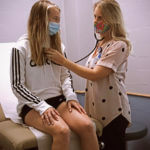4 Fast Facts on HPV and Cancer Prevention
With 14 million new cases of a common sexually transmitted infection (STI) occurring each year in the United States, health officials are pushing for males and females to vaccinate against the virus.
Check out four fast facts about America’s most common STI and how you can prevent the virus:
1. What is HPV?
HPV, or human papillomavirus, is a collective term used to describe over 150 viral strains spread through skin-to-skin contact.
The effects of HPV each viral strain vary – some strains cause no known health effects, while others can cause warts on the hands, feet, and genitals. High-risk strains of HPV can cause cellular changes that can lead to throat and reproductive cancers.
2. HPV is very common.
Yes, believe it or not, this virus has become the most common sexually transmitted infection in the States.
“HPV is so common that the CDC estimates that all sexually active adults will contract some form of the virus at some point in their life,” said Jessica Wooten, DNP at River Valley Family Care in Ravenswood, WV.
Since the virus can go unnoticed due to lack of symptoms, about 79 million people — men and women — are thought to have an active HPV infection at any given time.
3. Getting vaccinated at a young age decreases your chance of contracting HPV.
Dr. Wooten advises the ideal age for males and females to be vaccinated is between 11 and 12 years old. Evidence shows that the vaccine is most effective in the body when given around this age, and before any sexual contact.
The CDC recommends that 11- to 12-year-olds receive two doses of HPV vaccine at least six months apart to protect against cancers caused by HPV.
If you didn’t get the HPV vaccine while a pre-teen, catch-up vaccines are recommended for men and women up to age 26.
4. The HPV vaccine is safe and effective for cancer prevention.
Like all vaccines, the HPV vaccine has been through extensive safety testing and is constantly being monitored. According to the CDC, clinical trials showed the vaccines provide close to 100% protection against precancers and, for Gardasil and Gardasil 9, genital warts. Ten years of data show that HPV vaccination provides long-lasting protection.
Contact your doctor for more information if you have not already received the HPV vaccination.

February 1, 2018
Coplin Welcomes Pediatric Physician
Dr. Cathy A. Dailey has joined our primary care staff as a pediatric physician. She is now seeing patients 18 and under at Parkersburg Family Care.

March 1, 2018
New Family Care Facility Opens in Parkersburg
Coplin Health Systems has opened a second family care clinic at 3705 Emerson Square in Parkersburg. For information, call 304.917.3530.

August 29, 2018
Coplin Health Systems Announces Departure of CEO, Derek Snyder, and Selection of Interim CEO
Coplin Health Systems and its Board are announcing that, effective September 7th, Derek Snyder, its CEO is departing the organization.




